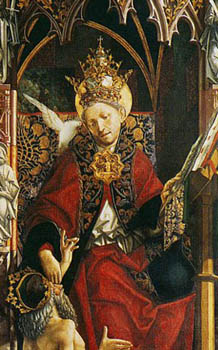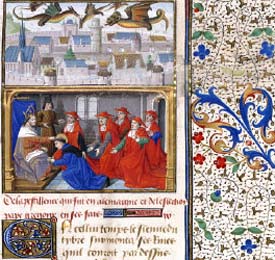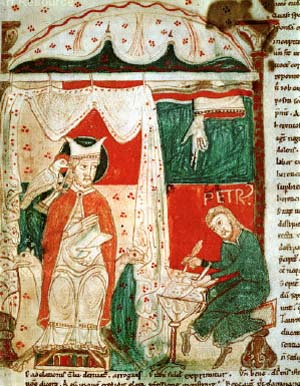 |
The Saint of the Day
Pope St. Gregory the Great – March 12
Prof. Plinio Corrêa de Oliveira
Biographical selection:
St. Gregory the Great (c. 540-604) was born in Rome of a wealthy patrician family and received an excellent education. The broadness of his knowledge caught the attention of the Emperor, who appointed him prefect. His tenure in this position earned him fame in Rome for his learning and capacities.

St. Gregory the Great
Fathers of the Church altar, Munich
|
When his father died, he inherited an enormous fortune. With it, he founded seven monasteries and, against his will, was elected abbot of one of them. He was made one of the seven papal deacons in 578 and later ordained by Pope Pelagius II. He served as papal nuncio to the Byzantine court in Constantinople from 579-585.
He set out to evangelize England, but was recalled to Rome by Pope Pelagius in 589 when plague struck Rome. With the death of Pope Pelagius, who was stricken by the plague, all of Rome acclaimed Gregory as Pope. He fled to a cave, but the people found him and brought him back to Rome, where he was enthroned on September 3, 590. He fought against Arianism, converted the Lombards, and wrote his seminal letter to the schismatic bishops of Istria.
He reformed the liturgy and established the style of chant thereafter known as Gregorian. He converted the last pagan temples into Catholic churches, and vigorously combated simoniacs, schismatics, and those who practiced witchcraft. He wrote many books and countless letters that had a great influence on the Middle Ages and earned him the title of Doctor of the Church. After thirteen years on the Throne of Peter, he died on March 12, 604.
Comments of Prof. Plinio:
It is quite just to consider St. Gregory the Great as one of the founders of the Middle Ages. For we note that his life – both before and after he was elected Pope – closed the last door that separated his world from pagan antiquity, and opened the door to another era, the Middle Ages, which was just starting.

The plague strikes Rome and the election of Pope Gregory the Great - Le Miroir Historical, 15th century
|
Regarding pagan antiquity, he combated the remnants of Paganism. He ordered the last pagan temples to be transformed into Catholic churches. He wiped out Arianism, a plague that still remained from the two preceding centuries. Arianism was still alive in the West thanks to many barbarian tribes who had been seduced by that heresy. He fought vigorously against immorality and other bad customs from the old Roman Empire.
But he was also a builder of a new era. He was a great founder of monasteries, and became a superior of one of them. The monasteries played an important role in the foundation of the Middle Ages. He also worked to establish the chant that took his name, Gregorian Chant. With this he gave voice to the new era, for one can say that the Gregorian Chant characterized the Middle Ages from beginning to end. He helped to solidify the Benedictine Order and to define its monastic life with the majestic tone it adopted.
The missionary facet of St. Gregory’s life is also admirable. He was the one who sent the missions to England and Ireland. From there, missionaries returned to the Continent to convert Germany. In this way, he spread the seeds of medieval Christendom everywhere.

Gregory the Great dictating to his scribe Peter
Moralium of St. Gregory, 12th century
|
He also dealt with one the most difficult problems of that time, which was the decadent Eastern Roman Empire. He tried to strengthen the walls of that city of Jesus Christ that threatened to return to its persistent softness, immorality, and heresies. The ungrateful Byzantium would again reject the zeal of the Popes to steer it back onto the right road. This erroneous path would culminate centuries later in the Eastern Schism.
So, we see that all the problems of his time passed through the hands of that great man. He faced them, analyzed them, and resolved many of them. He wrote works that became the pillars of medieval thinking. He had a most rich and admirable life turned to the service of the Holy Church and Christian Civilization.
If St. Gregory the Great were to be resurrected, what he would say about our times? What does he say about it now, from the heights of Heaven?
If he were to return, he would be astonished at the great difference he would find. Certainly he lived in hard times, an epoch of disorders and notable crimes. Notwithstanding, the people of that time were able to recognize a great saint and oblige him to accept the Papacy. Today, the people have lost the notion of what sanctity is, and very often applaud the evildoers inside the Church.
Let us pray to St. Gregory the Great asking that he transform our epoch – after the purifying chastisement through which it needs to pass – into a new Middle Age. A new era still more glorious and giving yet more glory to God and Our Lady than the past one. He will understand this prayer, since he was one of the founders of the Middle Ages.


  | | Prof. Plinio Corrêa de Oliveira | |
The Saint of the Day features highlights from the lives of saints based on comments made by the late Prof. Plinio Corrêa de Oliveira. Following the example of St. John Bosco who used to make similar talks for the boys of his College, each evening it was Prof. Plinio’s custom to make a short commentary on the lives of the next day’s saint in a meeting for youth in order to encourage them in the practice of virtue and love for the Catholic Church. TIA thought that its readers could profit from these valuable commentaries.
The texts of both the biographical data and the comments come from personal notes taken by Atila S. Guimarães from 1964 to 1995. Given the fact that the source is a personal notebook, it is possible that at times the biographic notes transcribed here will not rigorously follow the original text read by Prof. Plinio. The commentaries have also been adapted and translated for TIA’s site.
|
Saint of the Day | Home | Books | CDs | Search | Contact Us | Donate

© 2002- Tradition in Action, Inc. All Rights Reserved
|
 |

|